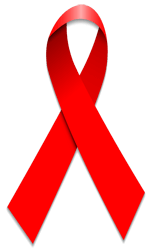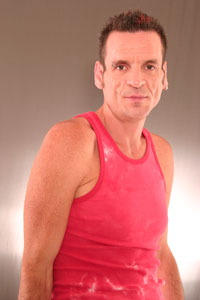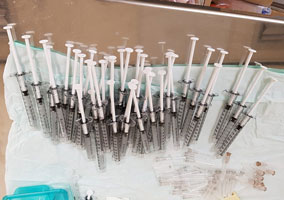My HIV/AIDS story
'Doctor, just tell me how long I’ve got to live?'
Note this article contains some personal and graphic health details.
November 2021
 I had an experience where I had to admit to myself that I was a gay man I had to completely change my life when
I came out. This was in the 1990s and I was in my early thirties. Remember that in those times it was more difficult to be an out gay man in many work and social circles in the UK
compared to now. This was especially true if you were outside of London. At the time, I felt I had to disappear from everyone I knew, and move to the other end of the country.
I was living in Scotland so I moved to London and then to Brighton on England’s south coast.
I had an experience where I had to admit to myself that I was a gay man I had to completely change my life when
I came out. This was in the 1990s and I was in my early thirties. Remember that in those times it was more difficult to be an out gay man in many work and social circles in the UK
compared to now. This was especially true if you were outside of London. At the time, I felt I had to disappear from everyone I knew, and move to the other end of the country.
I was living in Scotland so I moved to London and then to Brighton on England’s south coast.
Shortly after I'd set up a home in Brighton in 1998, in mid 1999, I was asked to go to a sexual health check-up. It’s bit like the annual motoring ‘MOT’ test – a regular safety check for vehicles in the UK. They asked me if I wanted to include an HIV test. I agreed to this, even though I did not think it very likely that I had HIV.

Age 36, just before I started medication
A week later they asked me to come in; I thought this was routine. In hindsight, I think I was a bit naive about how health workers discussed these issues with patients.
So I went into the clinic and chatted with the doctor; a sexual health adviser was also present. The doctor said that everything was fine but the HIV test came back positive.
I thought there was no way I had HIV, so I smiled and said “Cool, so that’s fine, then?”, thinking ‘positive’ was a good thing.
I glanced back at the counsellor and the look on her face was a shock to me. Then it suddenly clicked. My mind went blank and I could no longer think.
Eventually, I knew what I wanted to say: 'Doctor, just tell me how long have I got to live?'. However I could not get these words out of my mouth to ask them. I was in shock. The health workers took some more blood samples to assess my infection. Nothing registered and I still could not ask them the question, even though I was with them for at least another 30 minutes. It may have been longer but time did not register along with everything else. When I got home, I rang up work; I made some excuse to take the day and next day off work and told my boyfriend at the time to have a test. Then I broke down and just cried to myself.
Even with HIV diagnosis, it took me a few years to admit to myself that I was gay and for me to take the steps to come out socially as a gay man. I had a difficult situation as I could not come out easily in my work or social life. Not only was the social circle I mixed in was very ‘butch’. You'll understand why when I explain; there were employment and legal consequences if you were known to be a gay man. While I was studying to become a web developer, I was also serving in the British Army as a part-time ‘Territorial’ soldier or reservist in the UK special forces (SAS). As you might imagine, I faced a nightmare coming out in this environment. At the time, if you served in the UK armed forces and it was found out that you were gay, you were automatically thrown out with a 'dishonourable discharge' which was on your record, plus a gay man would face the risk of being put in a military prison. Today, thankfully, things have improved for LGBTQ+ people serving in the UK armed forces. From 2000 the law was changed so you can be out and still help defend your country.
But living with HIV, especially in the early days of my diagnosis, was very hard to handle, to put it mildly. I felt like a leper, disgusting and dirty. With HIV, it was like I had to come out again. But this time it was with this virus. Note at the time, even for some sections of the LGBTQ+ communities, this was a stigma. It is difficult to remember all the details but I will do the best I can.
So I went to my second medical appointment where I was told by the doctors that things were not good. My CD4 count was about 100 which is very low. A healthy person’s CD4 count would usually be around 500 to 1,400 cells per cubic millimeter of blood. CD4 cells are white blood cells that fight infection. A person’s CD4 cell count is an indicator of how well the body's immune system is able to fight infections. CD4 cell counts are obtained from blood samples as part of laboratory monitoring for HIV infection. CD4 counts decrease over time in HIV-infected people who are not receiving anti-retroviral therapy. At levels below 200 cells per cubic millimeter, patients become susceptible to a wide variety of opportunistic infections. These include thrush and herpes, many of which can be fatal to an immunocompromised patient. My CD4 count was so low the docs put me on meds straight away. They also said that, as the CD4 count was so low, I'd likely have caught HIV in 1998. This would have been when I was still living in Scotland.
I was shocked by the daily drug routine. It started at 34 pills a day. Each day I had to wake up at 6am and drop two large pills the size of a couple of two-pence pieces into a glass of water. Then stir them till they were dissolved. After another two hours at 8am I had to take another set and these had to be taken with food. Then I would have another set at 8pm with food and a final set at 11pm. As far as I knew, I would have to do this for the rest of my life.
Over several months, my CD4 count continually dropped, so they changed my doctor to one of the top HIV doctors in the country. He is still my doctor today. In about 2001/2 I became very ill, catching meningitis, pneumonia and some other conditions that I can't remember. All this resulted in several stays in hospital for over a week. Then after I recovered from this, I caught shingles (adult chicken pox). At this point, in my two week stay in hospital my CD4 count was just 7 cells/mm3. My immune system was so low, I did not feel ill with shingles as I had no immune system to fight this. Goodness knows how I did not die. I think the highest the viral load got to 174,000, which was not high considering my CD4 counts.
Before I came out as a gay man, I was very fit physically; I would go as far as saying I was in the top 0.5% of the population for fitness. As explained, I'd served in the UK’s special forces; my level of physical fitness may have helped save my life. However the side effects of being on these drugs was still devastating to my health. One impact was that the drugs reduced my body fats; so taking body mass from my face and ass, leaving me looking weak and as if I was wasting away. Also, I had to take anti-sick tablets as I would often feel very queasy for much of the day. Without going into too much detail, another disturbing effect for me (and probably for other people nearby ;)) was on my bowels. I would often feel a sudden rumbling in my stomach; that was an indication that I needed to race to the bathroom. There were several occasions when I could not find a bathroom quick enough. By this time, I had now lost all my body definition which, as said, had been a lean and military level physique. When I looked in the mirror I seem to have aged.
For the first few years on this drug regime, if I did the simplest exercise, I would feel pain. So if I just walked into the centre of Brighton and wandered around the shops, I would start to feel unwell after a few minutes and had aching limbs. When I got home it would feel like I'd been shoved into a washing machine; my body would ache all over as if I was bruised, but without any bruise marks. I would often feel tired and would need to sleep for about as much as 20 hours a day.
It took about five years for my CD4 count to rise above 100, which is very rare; my appointments with the doctor were once a month. This means that I basically had AIDS for well over five years both by the UK and USA definitions.
- UK: AIDS is currently defined as an illness characterised by the development of one or more AIDS-indicating conditions (I had four of these). It is diagnosed in people infected with HIV when they develop certain opportunistic infections or malignancies for the first time.
- USA: When a CD4 count is lower than 200 cells/mm3 a person will receive a diagnosis of AIDS. My count dropped to just seven.
One of the drugs I was on, Efavirenz, produced some severe side effects. I would often have very disturbing dreams and had to force myself to wake up. Then, if I fell asleep again, the dream would come back. The only way to stop this was to get up and be awake for ten minutes or so. I know people that have woken up and looked for monsters in their wardrobe and were glad to come off these pills. Over the years as medication has improved, the number of pills I have to take each day has dropped; now I'm just taking one pill a day. I have also had an undetectable viral load and have recorded a CD4 count above 1,000 for over ten years.

Syringes ready
As mentioned, a side-effect was a loss of body fat in the face; fortunately, there is now a treatment: polylactic acid implants. These can correct loss of facial fat in
HIV-infected patients, The implant is injected into the skin. As you can see from the photo this involves over 30 syringes, about 140 injections.
It does not restore fat, but stimulates the development of collagen. This thickens the layer beneath the surface of the
skin and can help to improve the facial appearance. This involves lots of injections into the face and can be very unpleasant, especially for people like me who have a phobia
about needles.
On the plus side, with my being HIV positive, I am able to participate in clinical trials. When I participated in two of these trials, in 2017, I found I had two different cancers. These would not have been detected. Both cancers have been treated with minor operations, and as of today, I have been given the all clear. I look forward to the day when we have a full cure for HIV/AIDS.
Part one: My dramatic coming out story Part three: Tribute to my mum
More information in the UK on Worlds AIDS day: GMFA THT




